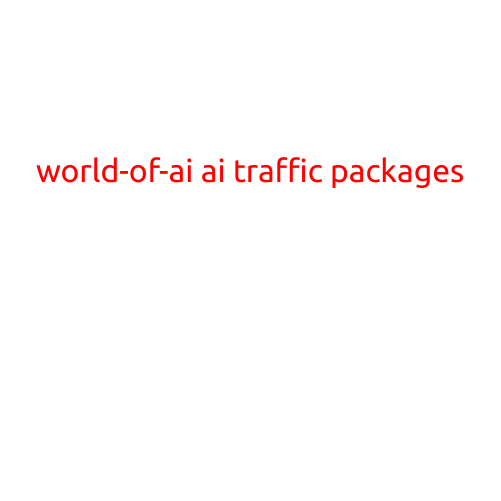
World of AI: AI Traffic Packages - Revolutionizing Roadways
The world is on the cusp of a significant transformation in the way we navigate our roads. Artificial Intelligence (AI) is gradually seeping into the transportation sector, and its impact is set to be nothing short of revolutionary. AI traffic packages are being developed to optimize traffic flow, reduce congestion, and make traveling safer and more efficient.
In this article, we’ll delve into the world of AI traffic packages, exploring what they are, how they work, and the benefits they offer.
What are AI Traffic Packages?
AI traffic packages are software solutions designed to analyze and manage traffic flow in real-time. These packages utilize advanced algorithms, machine learning, and data analytics to monitor and control traffic signals, optimize traffic routing, and predict congestion patterns. The goal is to reduce travel times, reduce emissions, and enhance overall driving experiences.
How do AI Traffic Packages Work?
AI traffic packages function by collecting and analyzing data from a variety of sources, including:
- Sensor data: Traffic sensors installed along roads collect data on traffic volume, speed, and occupancy.
- Cloud-based processing: This data is transmitted to the cloud, where advanced algorithms analyze and process it in real-time.
- Machine learning: The system uses machine learning to identify patterns and anomalies in traffic flow, allowing it to adapt and adjust its strategy accordingly.
- Control systems: The analyzed data is then used to adjust traffic signal timings, optimize traffic routing, and provide real-time traffic updates to drivers.
Benefits of AI Traffic Packages
The benefits of AI traffic packages are numerous and significant:
- Reduced congestion: AI traffic packages can optimize traffic flow, reducing travel times and reducing congestion.
- Improved safety: By analyzing and predicting traffic patterns, AI systems can identify high-risk areas and provide real-time alerts to drivers, reducing the likelihood of accidents.
- Increased efficiency: AI traffic packages can optimize traffic signals, reducing idle times and reducing fuel consumption.
- Enhanced driver experience: Real-time traffic updates and optimized routing can reduce driver frustration and increase overall satisfaction.
- Reduced emissions: By optimizing traffic flow and reducing congestion, AI traffic packages can help reduce emissions and contribute to a more sustainable future.
Real-World Applications of AI Traffic Packages
AI traffic packages are already being implemented in various cities around the world, with promising results. Some examples include:
- Singapore: The city-state has implemented an AI-powered traffic management system, which has reduced travel times by up to 25%.
- Austin, Texas: The city has deployed an AI-based traffic management system, which has reduced congestion by up to 15%.
- Shanghai: The Chinese city has implemented an AI-powered traffic management system, which has reduced travel times by up to 10%.
Conclusion
AI traffic packages are revolutionizing the way we navigate our roads. By leveraging advanced algorithms, machine learning, and data analytics, these packages are able to optimize traffic flow, reduce congestion, and enhance overall driving experiences. As the technology continues to evolve, we can expect to see even more significant benefits in the years to come.





